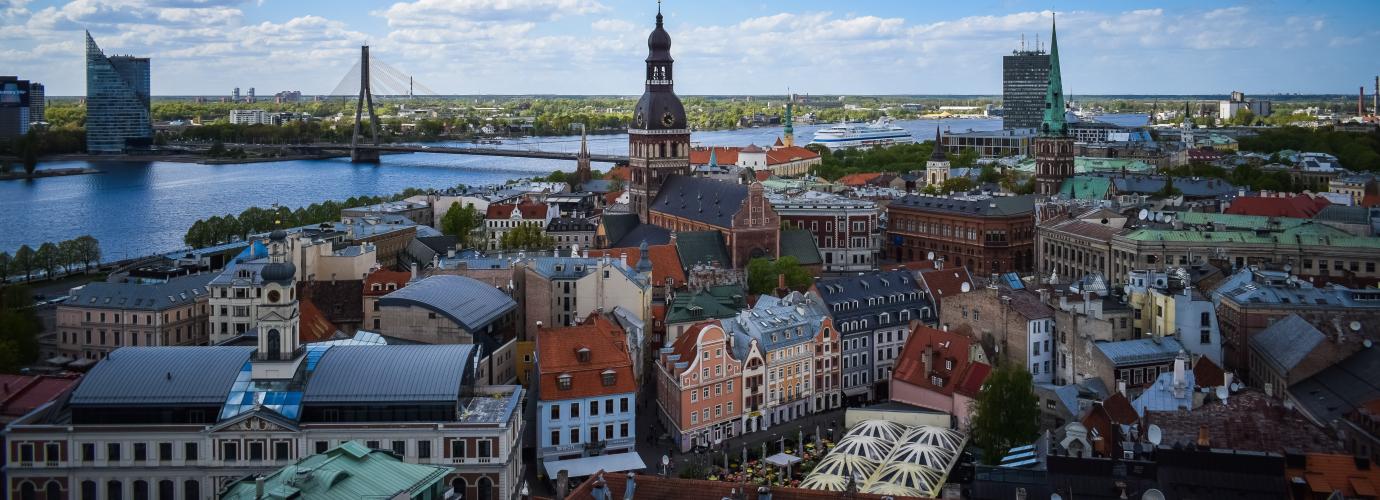Latvia is a democratic, parliamentary republic and the structure, authority and functioning of the public institutions of Latvia are set in the Constitution (Satversme) adopted on 1922. The people of Latvia hold the sovereign state power; they elect the Parliament, the Saeima, the main legislative institution. The people have the right to decide any publicly relevant issue in referendums except some issues specified by Satversme. The decision on dissolving the Parliament proposed by President of the State is also to be followed by a national referendum. The people have the exclusive right to take decisions on matters relating to the independence, sovereignty, territorial integrity, official language and the democratic public system of the state, as such matters shall be submitted to national referendum.
The Saeima (Parliament), the State President and the Cabinet of Ministers are the highest authorities of state power according to the constitution. People of Latvia elects the Saeima (Parliament). Saeima elects the President of the State who chooses and invites the candidate to the post of Prime Minister to form the Cabinet of Ministers (Government) which subsequently shall obtain the vote of confidence at the Saeima.
The Saeima
Legislative power is in the hands of the parliament - the Saeima consisting of 100 (one hundred) deputies. Legislative power and the right to take decisions concerning the national budget are vested in the Saeima. The Saeima also approves judges of courts of all the levels. Parliamentary elections take place every 4 years. The Saeima is elected in general, direct and equal elections by secret ballot, based on proportional representation. To attain representation in the Saeima, a party must receive at least 5% voter support. All citizens of Latvia who enjoy full rights of citizenship and who have attained eighteen years of age on the election day, are entitled to vote. Any citizen of Latvia, who enjoys full rights of citizenship and who is more than twenty-one year of age on the first day of elections may be elected to the Saeima.
The President
The Saeima elects the President for a term of four years by secret ballot with a majority of the votes of not less than fifty-one member of the Saeima. Any citizen who has attained the age of forty years may be elected President. A person with dual citizenship may not be elected President. The same person must not hold office as President for more than two consecutive terms, that is, more than 8 years. The President of Latvia does not have extensive state powers and the main function is that of state representation. The President represents the State in international relations, appoints the diplomatic representatives of Latvia, and also receives diplomatic representatives of other states. The President implements the decisions of the Saeima concerning the ratification of international agreements. However, the President designates the Prime Minister, who appoints the ministers and proclaims laws passed by the Saeima and the President has the right to initiate legislation.
The Cabinet of Ministers
The Cabinet of Ministers is composed of the Prime Minister and the Ministers chosen by the Prime Minister. The Cabinet of Ministers holds executive power. All administrative institutions of the State are under the authority of the Cabinet. In order to fulfill their duties, the Prime Minister and other Ministers must have the confidence of the Saeima and they are also individually accountable to the Saeima for their actions. The Cabinet of Ministers has the right to submit draft laws to the Saeima. All matters that have not been decided by the Saeima are in the competence of the Cabinet of Ministers.
The Court System
In Latvia, court cases are heard by district (city) courts, administrative courts, regional courts, and the Supreme Court. Everyone has the right to defend their rights and lawful interests in a fair court and everyone is innocent until their guilt has been established in accordance with law. Judges are independent and subject only to the law. The Supreme Court is Supreme Court of Cassation and Appellate. The Constitutional Court is not a part of the general court system; it is a special court reviewing the compliance of laws with the Constitution and the correspondence of legal issues in general to the acts with a higher legal force. It can declare laws or other enactments or parts thereof invalid.
General responsibility of education at central and local level
The main ministry involved in education provision is the Ministry of Education and Science, but there are other ministries involved as well, namely,
- Ministry of Culture,
- Ministry of Agriculture,
- Ministry of Defence,
- Ministry of the Interior,
- Ministry of Welfare.
Ministries are competent to suggest the establishment, reorganization or liquidation of educational institutions. Ministries develop the content and standards for vocational/professional subjects and control the implementation of the standards in the supervised institutions. Ministries also control financial operations in the institutions they are obligated to supervise. However, the role of other ministries decreases, as transfer of education institutions under subordination of the Ministry of Education and Science is ongoing.
In accordance with the Law on Administrative Territories and Populated Areas, the administrative territorial reform entered into force on July 1, 2021. 43 new local governments were created instead of the previous 119 local governments. The borders of the new administrative territories have also been changed accordingly. The functions of local governments include establishment and financing of educational institutions. According to the Law on Local Governments they are responsible for education provision of population:
- ensuring the specified rights of residents to acquire primary and general secondary education,
- ensuring children of pre-school and school age with places in education and training institutions,
- organisational and financial assistance to extracurricular education institutions and education support institutions,
- organisation of continuing education for teaching staff and pedagogical methodology work.

